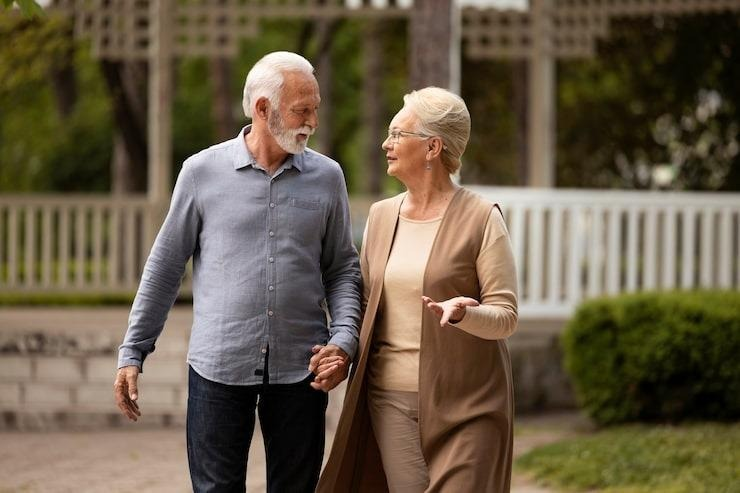As much as you’d love to, you can’t always be around your aging loved ones. You want them to keep doing what they love—whether that’s running or taking a walk in the park, tending vegetables in the garden or running a quick errand. But the fear of what could happen when they are alone never fades, and it’s terrifying.
And accidents don’t just happen outdoors. Even something simple like tripping when stepping out of bed or a slip in the shower can quickly get dangerous before anyone can reach them.
That’s where a mobile medical alert system steps in.
These wearable devices, usually in pendant or wristband form, are a lifeline that moves wherever your loved one goes. Unlike the old landline versions, these are portable, smart, and built to work anywhere. One button press, and help is on the way.
Here’s how mobile medical alert systems bring peace of mind—by keeping your loved one safe wherever they are.
Contents
1. GPS Location Tracking

We hate to imagine this, but what if your mom or dad ever feels lightheaded or disoriented during a walk outside? The last thing you want is for them to struggle explaining where they are. Plus, looking for them physically isn’t the best way to offer help fast. The GPS tracker built into the device takes care of that.
All they need to do is press the button. A trained professional answers within seconds and pinpoints their exact location. They’ll stay on the line, talk with your loved one, contact you, and even send help right where they are.
If your loved one enjoys exploring—driving across states or hiking a trail—a GPS comes in handy.
So, get the best mobile medical alert system from reputable providers with a wide network coverage because, as long as there’s a cell signal, someone can find and help them quickly. That can make a difference, especially when they are in danger and don’t know where they are.
2. Automatic Fall Detection
Falls can be fatal. When someone falls and can’t reach their phone, things can spiral out of hand pretty fast. In fact, studies show that more than 300,000 seniors are treated for hip fractures yearly, and 95% of these are due to sideways falls.
This feature allows the device to sense a sudden impact and automatically alert the monitoring center. The best part is that your loved one doesn’t even have to press a button. So, if they’re disoriented or unconscious, help still gets notified. This security feature can make all the difference in those first few critical minutes.
3. Two-Way Voice Communication
Emergencies happening when seniors are alone can be scary. That’s why the two-way voice feature is a game-changer, ensuring that they can actually talk to someone right away. Your loved one doesn’t need to fumble with a phone, trace contacts, or unlock screens, panicking. You’d be surprised at the trauma that having someone to talk to can prevent.
They just press the button, and a professional immediately answers on the other end. And to ensure smooth communication, the devices are built with a loudspeaker and a sensitive mic.
The responder will ask what’s happening to offer quick assistance as they dispatch help for serious cases. This sounds simple, but that human connection is reassuring.

4. 24/7 Professional Monitoring
Hiring a caregiver to make up for looking after your loved one when not around is a good idea, but they too can’t be there all the time. And it’s in those tiny moments when something goes wrong. That’s why around-the-clock monitoring is the heart of any reliable mobile medical alert system.
A medical alert keeps them connected to professionals who are trained to handle emergencies and send the right response no matter the time. On top of 24/7 monitoring, many services now offer an app that lets you track their location, battery level, and activity as well. They notify you when they leave home or return, giving you comfort knowing everything’s okay.
Plus, the mobile alerts come with long battery life—some lasting several days or more on a single charge. Some come with a backup battery and issue alerts whenever battery levels fall to certain limits a day or two ahead, helping prevent ugly surprises.
5. Wide Network Coverage
Modern systems use nationwide cellular networks alongside Wi-Fi to stay connected almost anywhere. Whether your parents are relaxing at home, shopping, or visiting friends across town, the system provides safety as long as there’s cell coverage. This means they’re not confined to the house; instead, protection goes with them wherever they go.
6. Water Resistant Capability

Many falls happen in the bathroom, and that’s why water-resistant features are so important. Your loved one can wear the device in the shower or bath without worry. It also keeps the device working whenever they are outside and it rains unexpectedly.
These buttons are also designed to be lightweight and discreet. You barely notice they are there after wearing them a few times. They blend in and sit comfortably under clothing or around the neck, but they’ll be there when you need them.
Conclusion
Caring for an aging parent and a demanding work life often feels like walking a tightrope. And even though you want them to stay independent, keeping them safe is more important. A mobile medical alert system gives you both. It watches your loved ones 24/7 and lets them live freely, while you rest easy knowing that if anything happens, help is only a button away.
For seniors, the freedom that these systems offer is priceless. It allows them to do the things they love without fear of falling. For you, you don’t have to call every hour or keep wondering if they’re okay.
With the right provider and a reliable device, you can give your loved ones the care they need even when you are away. So, do proper research and commit to one that meets your needs.




